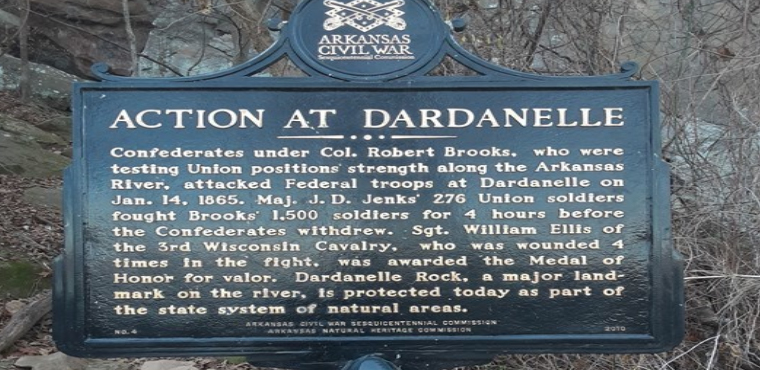Memorial Day is much more than a vacation day away from work, a day to spend with family, and a day to cook out. Created as a day to honor our veterans, it is a time to reflect on the sacrifices men and women made to preserve our freedom. Nothing reminds us more of that than to hear actual stories and remembrances of people who served, especially those who we regard as heroes and examples of patriotism. In the U.S., the highest example of this patriotism is shared by those who have received America’s highest military award, the Congressional Medal of Honor.

Arkansas has a total of twenty-five recipients, all of whose name and likeness is etched into a monument at the state capitol. One of those recipients received his medal from a battle fought in Dardanelle, Arkansas and later lived at Frog Bayou near Alma.
Sargent William Ellis was from Wisconsin and came from humble beginnings as a wool carder. He enlisted in the service at the beginning of the war and participated in several battles and skirmishes in Oklahoma and Arkansas. By early 1865, it looked like the war was almost over. Union forces held most of Arkansas but there were still significant Confederate forces in the south-eastern part of the state to put up resistance. Colonel William Brooks decided to make a last attempt to gain control of the Arkansas River. Organizing over 1,500 troops, he traveled up what is probably today’s Highway 7 and prepared to attack Dardanelle.
By 1865, Dardanelle was a town ravaged by previous skirmishes and battles. After a major skirmish there in 1863, much of the town was in shambles with a population divided in support of the war. An earthen stockade stood near the old high school site and was occupied by Ellis, his commanding officer J.D. Jenks, and about 274 other men. In their possession was also two cannon and the crews to man them.
On the afternoon of January 14, 1865, Brooks and his men poured through the woods south of town, following the paths along the old military road and a road running approximately where highway 22 is located. For four hours the battle raged with thousands of bullets flying through the air. Cannons fire roared from both sides as the Confederates attempted to flank the small contingent of Union troops. During the fight, Ellis was wounded but continued fighting, receiving two more wounds in the process. His commanding officer ordered him to the rear but the fighting was too intense and Ellis was needed. Exposing himself to more danger, he continued to fight, receiving his fourth wound in the process. The Union suffered 29 causalities, nearly one in five of their men. The Confederates lost eighty-one men. Eventually, Brooks realized the futility of his efforts and withdrew his forces. He later moved up the river and attacked Roseville but that is another story.
Ellis was severely injured and took months to recover. For his bravery, he became the first Arkansan to receive the Army Medal of Honor and Congressional medal.
Today, one can travel through the quite peaceful streets of the town, little realizing the bravery and sacrifice made by both sides. A small number of men, an insignificant battle in the scheme of things, but a group of dedicated men that offered the most valuable thing they possessed, their lives, for a country they believed in. On a larger scale, thousands of white crosses mark the countryside of France, the plains of Germany, and the beaches of the Pacific. All of these are testament to the men who fought and died so that we can celebrate with our families.
Let us never forget!!!






